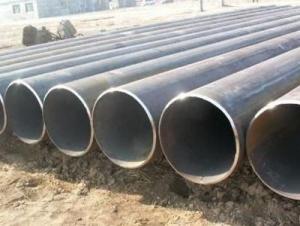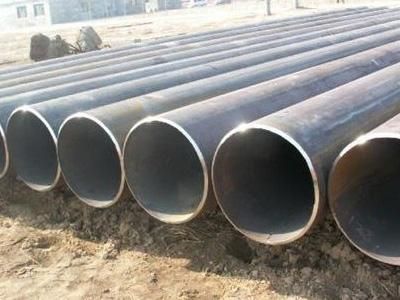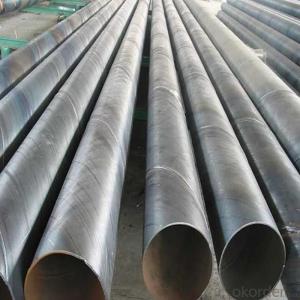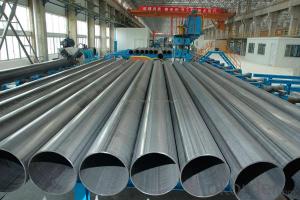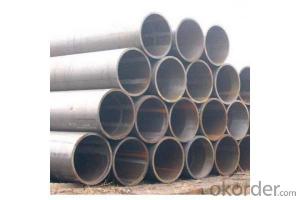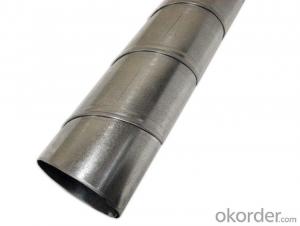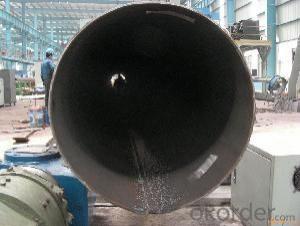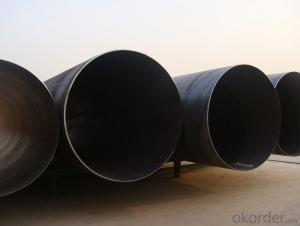LSAW SSAW CARBON STEEL PIPE ASTM API 24'' 26'' 28'' 32''
- Loading Port:
- Tianjin
- Payment Terms:
- TT OR LC
- Min Order Qty:
- 1 m.t.
- Supply Capability:
- 3000 m.t./month
OKorder Service Pledge
OKorder Financial Service
You Might Also Like
Packaging & Delivery
Packaging Detail: | Normal exporting packing,in container or bulk vessel or as per clients' request |
Delivery Detail: | 2 months after confimed contract |
Specifications
Large Diameter API 5L X70 PSL2 LSAW Steel Pipe
Grade: X42, X46, X50, X52, X60, B, C
OD: 1.5"-28"
WT: SCH10-SCH160
Large Diameter API 5L X70 PSL2 LSAW Steel Pipe
Specifications:
u Standard: API 5L
u Grade: B, C, X42, X46, X50, X52, X56, X60, X65, X70, X80
u OD: 1.5"-28"
u WT: SCH10-SCH160
u Length: 5-12m
u Ends Finish: plain end, bevel end, grooved end
u Surface Treatment: bare, black varnished, oiled finish, red color, anti-corrosion, 3PE, FBE or epoxy coating
u Technique: hot rolled or cold drawn
u Application: api 5l steel pipe for conveying oil, water, gas
u Invoicing: based on theoretical weight or actual weight
u Payment Terms: L/C at sight, T/T or Western Union
u Trade Terms: FOB, CFR, CIF
u Certification: ABS manufacturing assessment, ABS design assessment, API 5CT, API 5L, DNV manufacturer certificate, ISO9001 quality management system certificate, ISO14001 environment management system certificate, GB/T28001 occupational health and safety management system certificate, A1 class manufacturing license of special equipment certificate, CCS, GL, LR, SGS, TüV, PDE
- Q: What are the standard dimensions for steel pipes?
- The standard dimensions for steel pipes vary depending on the application and industry. However, common sizes range from ½ inch to 48 inches in diameter and have various wall thicknesses based on the required strength and pressure rating.
- Q: Can steel pipes be used for the construction of high-rise buildings?
- Yes, steel pipes can be used for the construction of high-rise buildings. Steel pipes offer several advantages such as high strength, durability, and resistance to fire and corrosion. They can be used for various structural elements including columns, beams, and bracing systems, providing a reliable and cost-effective solution for constructing tall buildings.
- Q: How are steel pipes installed underground?
- Steel pipes are installed underground through a process called trenching, where a trench is dug to the desired depth and length. The steel pipes are then placed in the trench and secured using various techniques such as welding or threading. The trench is then backfilled, ensuring proper compaction around the pipes to provide stability and prevent movement.
- Q: What are the different methods of joining steel pipes?
- There are several methods of joining steel pipes, including welding, threading, flanging, grooving, and using mechanical couplings.
- Q: Can steel pipes be used for transporting hazardous materials?
- Yes, steel pipes can be used for transporting hazardous materials. Steel is known for its strength and durability, making it suitable for handling and containing hazardous substances. It is commonly used in various industries, such as oil and gas, chemical, and wastewater treatment, to transport materials that pose a potential risk to human health or the environment. Additionally, steel pipes can resist corrosion and high pressure, ensuring the safe transportation of hazardous materials.
- Q: Difference between seamless steel pipe and welded pipe
- Seamless steel pipe can be used in various industries, such as liquid, pneumatic, pipeline and gas pipeline.
- Q: How are steel pipes used in the automotive exhaust systems?
- Steel pipes are commonly used in automotive exhaust systems because steel is a durable and heat-resistant material. Steel pipes are used to transport the exhaust gases from the engine to the muffler and tailpipe, ensuring that the gases are safely and efficiently expelled from the vehicle. These pipes are designed to withstand high temperatures, corrosion, and vibration, making them an essential component in the exhaust system.
- Q: Can steel pipes be used for underground fuel storage systems?
- Yes, steel pipes can be used for underground fuel storage systems. Steel pipes are commonly used for underground fuel storage due to their durability, strength, and resistance to corrosion. Additionally, steel pipes can be easily welded and sealed, ensuring a secure storage system for fuels.
- Q: Can steel pipes be used for oil transportation?
- Yes, steel pipes can be used for oil transportation. Steel pipes are commonly used in the oil and gas industry for the transportation of crude oil, petroleum products, and natural gas. They are preferred due to their strength, durability, and resistance to corrosion. Steel pipes are capable of withstanding high-pressure environments and can be used for both onshore and offshore oil transportation. Additionally, steel pipes can be welded together to form long pipelines, making them a cost-effective solution for transporting oil over long distances. Overall, steel pipes are a reliable and efficient choice for oil transportation.
- Q: How are steel pipes protected from damage during transportation?
- Various methods are used to protect steel pipes from damage during transportation. One commonly employed technique involves applying protective coatings to the pipes. Materials like epoxy, zinc, or polyethylene are often used for this purpose, creating a barrier between the pipe and external elements. These coatings effectively prevent corrosion and damage during transit. In addition, steel pipes are frequently bundled together and secured using straps or bands. This bundling ensures that the pipes remain in place and prevents any shifting or rolling during transportation. Furthermore, padding or cushioning materials, such as foam or rubber, may be utilized to provide extra protection and reduce the risk of damage from impact or vibration. Sometimes, steel pipes are placed in crates or containers to provide further safeguarding. Crates are designed to snugly fit the pipes, offering a secure enclosure that shields against external forces. On the other hand, containers create a protective environment for the pipes, shielding them from the elements and potential impacts. To guarantee the safe transportation of steel pipes, proper handling and loading techniques are crucial. Pipes should be lifted and loaded onto transport vehicles with care, utilizing suitable equipment like cranes or forklifts to minimize the risk of damage. It is also essential to properly secure the pipes within the transport vehicle to prevent any movement or potential damage during transit. Overall, a combination of protective coatings, bundling, padding, and secure packaging or loading techniques is employed to ensure the safety of steel pipes during transportation. These measures guarantee that the pipes arrive at their destination in optimal condition, ready for use in various applications.
Send your message to us
LSAW SSAW CARBON STEEL PIPE ASTM API 24'' 26'' 28'' 32''
- Loading Port:
- Tianjin
- Payment Terms:
- TT OR LC
- Min Order Qty:
- 1 m.t.
- Supply Capability:
- 3000 m.t./month
OKorder Service Pledge
OKorder Financial Service
Similar products
Hot products
Hot Searches
Related keywords
